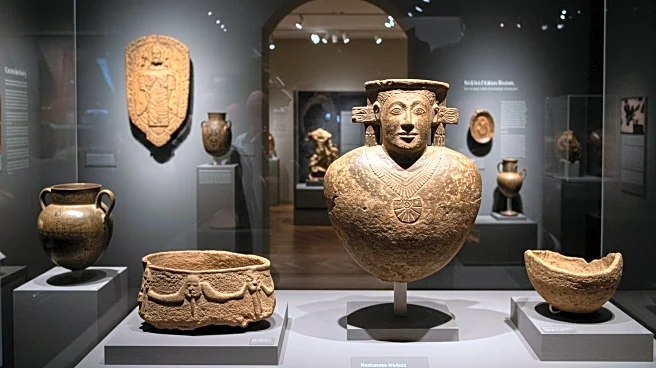What's Happening?
The mayor of New York, Eric Adams, alongside the World Jewish Restitution Organisation, has called on cultural institutions to support the extension of the Holocaust Expropriated Art Recovery (Hear) Act. This comes in response to reports that US museums are lobbying against a bill designed to improve the chances of claimants in lawsuits over Nazi-looted art. The New York Times reported that the Association of Art Museum Directors (AAMD) paid $8,000 to lobby against the bill, which aims to eliminate technical defenses used by museums to block claims. The Metropolitan Museum of Art has also expressed reservations about the bill, according to congressional aides. The Hear Act, introduced in 2016, seeks to ensure claims for Nazi-looted art are judged on merit rather than dismissed on technical grounds. It is set to expire on December 31, 2026, prompting Congress to consider extending it. A bipartisan group of senators has proposed a bill to eliminate further technical defenses, citing cases where museums have used such defenses to dismiss claims.
Why It's Important?
The lobbying efforts by museums against the Hear Act amendments highlight a significant tension between cultural institutions and the pursuit of justice for Holocaust survivors and their families. The proposed bill aims to remove legal barriers that have historically prevented rightful owners from reclaiming art stolen during the Nazi era. This issue is particularly poignant in New York City, home to the largest number of living Holocaust survivors. The outcome of this legislative effort could set a precedent for how restitution claims are handled, potentially impacting international relations and the legal framework surrounding art restitution. Museums argue that the amendments could undermine legal principles and lead to increased litigation, while proponents emphasize the need for transparency and justice.
What's Next?
The Senate Judiciary Committee has yet to schedule a discussion on the amended Hear Act, and it remains unclear when the bill might be put to a vote. As Congress reconvenes, stakeholders including museums, lawmakers, and advocacy groups will likely continue to debate the implications of the proposed amendments. The outcome could influence future restitution cases and the legal strategies employed by museums in handling claims. The ongoing dialogue may also affect public perception of cultural institutions and their role in addressing historical injustices.








